On 3 November, actor and filmmaker Tom Hanks, one of the most visible cultural figures of the past four decades, appeared on The Late Show with Stephen Colbert to promote his off-Broadway production This World of Tomorrow. But when he mentioned COVID, that part of the interview has oddly vanished.
Tom Hanks and that subway moment
Colbert joked about Hanks riding the subway while wearing a mask: “that guy is clocking you so hard,” referencing photos that had circulated earlier in the week. The framing echoed news coverage that had appeared in the days prior, primarily in tabloids, describing Hanks as travelling “incognito” on the subway.
- “Hollywood superstar goes completely incognito as he rides NYC subway” (Page Six)
- “Tom Hanks goes incognito on NYC subway with mask and beanie during recent trip” (Fox News)
- “Oscar‑winning Hollywood legend ignored as he rides the train – would you have spotted him?” (The Sun)
- “Hollywood star Tom Hanks goes incognito in a mask as he rides the subway in New York City” (New York Post)
But on air, Hanks corrected the premise.
I’m doing a play right now so I cannot get sick… I’m not just trying to hide my profile. I’ve had COVID enough in my life, I don’t need to do that again. So I’m wearing this for health reasons.
Following the interview, Hanks’s onscreen remark about wearing a mask for health reasons was clipped and amplified across social media. The Instagram account of The Sick Times reposted a photo of Hanks riding the NYC subway in a mask, captioned “I’ve had COVID enough in my life.” Meanwhile, viral posts from Dr. Lucky Tran’s social media accounts excerpted Hanks’s line with commentary about masks and COVID prevention.
Framing the narrative over Hanks and COVID
Major entertainment desks also covered the interview, though omitting the COVID reference. People discussed the origin story for Toy Story. Playbill summarised an anecdote about forgetting his lines on a current play that Hanks himself co-wrote.
The Late Show’s own Facebook page promoted the clip as Hanks having “mastered his subway disguise,” omitting the part where Hanks explicitly said the mask was for COVID prevention. This echoed the frame of the previous tabloid coverage.
In the days following the interview, the only two Google News-indexed responses to the moment were a long-form analysis piece from The Canary, a publicly-regulated independent UK outlet, and a blog-style news release from the public health nonprofit World Health Network (WHN).
Tom Hanks said he wears a mask to avoid COVID on The Late Show with Stephen Colbert, and mainstream media fell silent or used previous, less-informative framing.
Why did one of the most documented people in the world saying the word “COVID” on national television in 2025 leave almost no trace in the media ecosystem?
The vanishing of COVID news
The word “COVID” has largely disappeared from mainstream news coverage, even as the likely consequences of repeated infections from a serious multi-system disease continue to show up in adjacent reporting: Event cancellations, rising rates of disability, excess mortality, declining life expectancy, school absenteeism, labor force instability, and serious illnesses and sudden deaths among public figures.
Understanding why requires looking at the incentives shaping modern media.
There are structural explanations inside media economics that help make sense of the absence of the word “COVID” from news coverage, even as its effects are widely reported.
One is brand safety keyword blocking, which expanded dramatically in the late 2010s and the early stages of the ongoing COVID-19 pandemic. Advertisers adopted automated “blocklists” to keep ads off stories containing certain terms. “Coronavirus” and “COVID” were among the most widely blocked words in 2020, causing significant revenue damage to newsrooms.
A report from the UK’s News Media Association estimated that UK publishers alone were estimated to have lost roughly £170 million in 2020 due to COVID-related keyword blocks suppressing monetization of accurate reporting. A later industry post-mortem in Wired describes how the brand-safety filters have stayed in place, continuing to depress the revenue potential of public health reporting and penalizing hard news topics generally.
The contraction of digital press and the rise of chokepoint journalism
The silence surrounding Tom Hanks’s comment may also reflect a structural shift in the media landscape in the disappearance of independent outlets.
Over the past decade, the United States has undergone a rapid contraction of both local and digital newsrooms. A study from Northwestern University’s Medill School estimate that since 2005, more than 3,000 newspapers have closed, reducing the volume of reporters who once supplied context and follow-up.
In parallel, the online journalism sector that had flourished in the 2000s and early 2010s—outlets like Gawker, Fusion, BuzzFeed News, Vice, The Outline, and HuffPost’s longform desk—collapsed over the following decade, through a combination of structural and targeted pressures. The 2008 financial crisis destabilized advertising dependent models, while platform monopolies, particularly Meta and Google, reshaped traffic according to opaque algorithms. At the same time, legal threats and strategic litigation, most notably the Peter Thiel-funded lawsuit that bankrupted Gawker, signaled significant risks for adversarial reporting. Those outlets specialized in identifying emergent cultural topics and scrutinizing celebrity narratives.
This contraction of the digital press has created a system of chokepoint journalism, in which a small number of gatekeepers determine which stories receive institutional attention.
Late night shows in the media ecosystem
In this environment, high-profile late night programs such as The Late Show with Stephen Colbert function as secondary gatekeepers within the information pipeline. Their monologues and interviews are built around the day’s headlines but also feed back into the news cycle. Segments are clipped for social platforms and written up by news desks.
That context places late night hosts like Stephen Colbert in a complex role, both as a satirist who challenges the dominant narrative and a deeply embedded actor within the same media ecosystem that sets and stabilizes mainstream frames. In that sense, whether Tom Hanks’s mask is described as a “subway disguise” or as protection against COVID can therefore shape both audience perception and the manner in which it gets framed in downstream reporting.
And public memory.
Syndication networks and the amplification of preferred narratives
The way the “incognito” angle appeared across Page Six, Fox News, The Sun, the Daily Mail, and U.S. entertainment aggregators reflects how quickly a single source frame can propagate through the entertainment news ecosystem.
Much of modern entertainment reporting is produced through centralized content feeds that supply multiple publishers. Aggregators that scrape headlines from participating outlets reinforce that momentum, pushing the same language into Google News, Yahoo Entertainment and social media “trending” topics. This creates the appearance of “consensus”, even if it was based on incomplete or misleading premises. Editors often do not revisit the underlying premise because these briefs are designed to be low‑touch and fast‑turnaround to drive traffic.
The Late Show has its own editorial and fact‑checking infrastructure — and hosted the Tom Hanks interview. Yet the “incognito” angle that was already circulating through the most visible entertainment news channels became the premise the show used. The tabloid interpretation was positioned as the authoritative narrative, even when the subject of the coverage contradicted it on air.
The reason why a less accurate framing may have been used to shape public memory originates in part from the unique pressures on entertainment news.
What happened to celebrity COVID news?
If you look across entertainment and culture reporting in 2024–2025, COVID appears consistently, though less frequently in name.
In 2025 alone, Josh Gad suddenly withdrew from a production of Jesus Christ Superstar at the Hollywood Bowl after announcing on Instagram that he had tested positive for COVID. In April, Carlos Santana postponed two Texas dates on his U.S. tour after being hospitalized for dehydration and then testing positive for COVID. Martin Short rescheduled a string of live performances after receiving a COVID diagnosis after NBC’s Saturday Night Live 50th anniversary special. Rod Stewart cancelled two concerts after his team confirmed he had contracted COVID‑19. These are only a handful of recent examples in which named COVID infections by well-known performers disrupted tours and productions. They sit alongside a broader trend of cancellations and absences attributed more vaguely to “illness.”
In 2024, Adele paused multiple weekends of her Las Vegas residency after doctors found her vocal cords were inflamed, telling fans she had to rest her voice. Sting postponed a concert due to illness, issuing an apology to fans. In the 2024 holiday season, Mariah Carey, abruptly cancelled two of her holiday tour dates. In June 2025, Rod Stewart canceled two Las Vegas dates ahead of Glastonbury. Mainstream coverage attributed these latter two disruption to “flu.” Research from the California Institute of Technology shows that many COVID‑19 antigen tests produce high rates of false negatives. This means many illnesses, including those clinically diagnosed as “flu” by default, may in fact be undetected COVID‑19 infections.
When before 2020 did someone attribute their illness to a generic “virus”?
In the past few years, multiple A-list performers have canceled or postponed dates citing a viral infection. In December 2022, Billy Joel postponed his Madison Square Garden residency show “due to a viral infection,” with doctors ordering vocal rest. In May 2023, Sam Smith stopped a Manchester Arena concert after a few songs and then canceled two additional dates, saying they had “fought off a virus” but suffered a vocal cord injury.
The reasons for the decline of reporting on the ongoing pandemic follow the same structural forces that invisibleize COVID in general news, while introducing several additional constraints specific to the entertainment industry. The first is the profit logic of entertainment ecosystems. Entertainment journalism is one of the sectors most exposed to “brand safety” rules, because their revenue skews toward lifestyle, fashion, beauty, travel and consumer advertising, the categories that have adopted some of the strictest keyword blocklists.
Layered on top of this is the structure of entertainment news, which is increasingly oriented around promotion and narrative management. Much of what appears publicly as “culture” or “celebrity” news begins with access that is tightly managed. Journalists at entertainment desks often rely on content that is explicitly agreed upon by publicists and executives. This means many stories under “entertainment” headings are lightly rewritten versions of commercial materials.
Issues of liability and COVID
There is also a documented incentive for entertainment outlets and production teams to avoid coverage that potentially raises liability concerns for insurers and studios, especially in the context of health or safety issues. For example, standard entertainment insurance policies began excluding communicable disease coverage such as COVID‑19 after 2020, meaning a single production shutdown could leave a studio fully exposed. Paramount Pictures filed suit in 2021 against its insurer for refusing to cover pandemic‑related shutdown costs for its Mission Impossible: Dead Reckoning Part One production, stating that repeated infections imposed costs that were not accounted for under traditional contracts.
In parallel, venues promoting live entertainment were embroiled in litigation over whether the presence of the COVID‑19 virus could trigger “physical loss or damage” under property insurance policies. The California Supreme Court’s 2024 decision in Another Planet Entertainment, LLC v. Vigilant Insurance Company held that the mere presence of the virus did not constitute a covered loss.
The financialization of celebrity
The absence of follow-up coverage around Tom Hanks saying he avoids “COVID“ also intersects with a broader infrastructure that quietly shapes what remains visible about public figures.
In the contemporary media economy, celebrity functions as a financialized asset. Public figures, particularly those operating at the A-list level, are embedded in multi-year commercial ecosystems. The same economic logic that inflates a celebrity’s value also renders it acutely vulnerable to volatility. The rise of accountability culture, visible in movements such as MeToo, Time’s Up, and calls for transparency on social media, have demonstrated that public perception can shift rapidly. Audiences now have direct channels for scrutiny. In this environment, any perceived instability can become a liability.
Illness potentially introduces volatility. For actors and musicians, it can delay production schedules, cause event cancellations, increase insurance costs and make casting directors hesitant about future commitments. Because the earnings associated with celebrity branding are often speculative and based on assumed stability, even accurate reporting about health issues may be flagged as reputationally sensitive.
This financial logic has helped drive the use of the online reputation management industry (ORM), and its more intensive extension, crisis public relations (crisis PR), to manage public perceptions of high-profile people.
Online Reputation Management (ORM) and algorithmic governance
Although the ORM/crisis PR complex tends to receive media coverage only when high-profile disputes erupt, for example Blake Lively’s ongoing litigation with Justin Baldoni for sexual harassment and on-set COVID exposure, the bulk of the work happens long before anything reaches the level of a visible crisis.
Online reputation management (ORM) firms operate within a digital information environment that is largely shaped by private interests. Most people assume that search results, news feeds, and social media trends represent an organic reflection of public sentiment. In practice, nearly every layer of that infrastructure is governed by proprietary algorithms and revenue-oriented systems that determine which information is most visible.
ORM firms exploit these structural features by using a mix of technical tools, search engine optimization (SEO) strategies and relationships with platform intermediaries. They monitor digital ecosystems for emerging mentions of their clients using social listening tools and evaluate which stories are gaining traction. When content is deemed reputationally sensitive, even if it is factually accurate, firms may initiate interventions. These can include boosting the visibility of preferred content that will outrank critical reporting and coordinated flagging to trigger platform review mechanisms, or even de-indexing to remove results from search. These actions often take place without public disclosure, and take advantage of the fact that, in most jurisdictions, platforms are under no obligation to explain their moderation decisions.
Information that might negatively impact the asset value of celebrities is routinely made functionally invisible online.
Crisis communications and public perception of COVID
Most of the public has only glimpsed this machinery when it becomes visible. The ongoing coverage of Blake Lively and Justin Baldoni offers a clear example.
In a September 2025 feature titled “How the Crisis PR Machine Shapes What You Think About Celebrities,” GQ examined how crisis communication and reputation management consultants control narratives around public figures. The author opens with a moment of personal confusion when her feelings toward Blake Lively shifted from admiration to ambivalence, even though she had not encountered any explicit negative content.
The article goes on to profile PR strategists, including those who formerly worked in political and state intelligence contexts, and traces how their tactics have migrated into celebrity branding. It explains that these firms operate, not through overt censorship, but by amplifying select narratives and redirecting attention so that by the time the public takes notice it appears “organic.”
This alleged use of crisis PR became news precisely because both sides had the resources to publicly counter one another’s narratives, bringing an otherwise opaque process into the open.
Legal routes
Because platform algorithms function with near‑zero transparency, the only way to trace how a story disappears or is deprioritized is often through legal discovery, court‑mandated document production in which emails, contracts, server logs or other records become visible to litigants and their counsel. This is how the Dominion Voting Systems case surfaced Fox News texts and editorial deliberations.
By contrast, less‑resourced persons rarely have the ability to force disclosure, meaning that information can be suppressed without any public accountability. A notable recent case involved an Amsterdam gym that allegedly used crisis communications after it was accused of exploiting undocumented workers. This means that most of the interventions executed by reputation management and crisis PR remain invisible.
If communications can shape public perception of a celebrity, even without direct contact to the content, how might our beliefs about more existential topics have been influenced?
How do we know what we know about the pandemic?
What’s at stake when silence becomes structural?
When one of the most scrutinized actors alive states, on one of the most watched platforms, that he wears a mask because he does not want to get COVID, and that statement draws no meaningful press attention, there is a deeper structural problem.
The Late Show’s own social media account repeated the narrative that Tom Hanks wore a mask to travel incognito, even though Hanks himself had just stated on air that he wore a mask because he did not want to get COVID. This less accurate framing was most likely not conscious, and therefore raises significant questions about public knowledge.
If Tom Hanks saying “COVID” on Colbert is not newsworthy enough to register, what else are we not hearing?
How do we navigate a crisis in which narrative control shapes not only what we see, but what we are allowed to remember?
Framing versus reality
A question that perhaps cuts to the heart of this event, is what it signifies when Stephen Colbert, whose cultural function has long been articulating interpretations of events that mainstream newsrooms may hesitate to state outright—and yet ironically may more accurately reflect the available information—defaults to a framing originating in tabloids, rather than the plainly stated words of the person sitting in front of him.
This editing of public memory isn’t simply discursive, but takes place against the backdrop of a crisis with staggering consequences. According to The Economist’s global excess death tracker, the ongoing COVID-19 pandemic may have killed more than 30 million people worldwide. COVID killed more people in four years than HIV/AIDS did in 40.
According to data from the Centers for Disease Control and Prevention (CDC), approximately one in five U.S. adults who have had a prior SARS‑CoV‑2 infection were still experiencing symptoms consistent with post‑COVID conditions. More broadly, a 2024 report by the Organisation for Economic Co‑operation and Development (OECD) projects that long COVID could be removing nearly 3 million workers from the labour force across member states, and costing at least $141 billion annually in lost wages alone.
The consequences of framing around COVID
Colbert’s own show has been disrupted by COVID. He has spoken publicly about testing positive multiple times, and about experiencing an emergency appendectomy weeks after a COVID related show cancellation in 2023.
Several social media commentators, including accounts like “@1goodtern” and “@MeetJess” were generating 700-1.6k likes and shares for posts with commentary engaging with emerging research linking COVID‑19 infection with downstream complications such as acute and complicated appendicitis. This is not mass virality by any measure, but represents significantly more traffic than the framing which was adopted in entertainment news.
A November 2023 Newsweek article titled “Stephen Colbert Health Scare Sparks COVID‑19 Vaccine Conspiracy Theories” drew on posts with less than 60 visible likes. While the article positioned itself as debunking, its editorial framing inadvertently amplified the frame of anti‑vaccine speculation, one with minimal online traction relative to the more rigorously researched posts about COVID’s secondary complications. When a major media figure’s health crisis intersected with COVID’s serious systemic effects, the public conversation was steered toward the more sensational but less substantiated angle, rather than the scientifically emergent one.
Two years later, the consequences of that editorial framing persist. Had the media ecosystem adopted the developing scientific consensus as its primary lens, it is possible that COVID’s long-term, systemic effects would be acknowledged as an explanatory framework for developing events, not just in terms of public health but the seismic crisis it creating in political society.
The most immediate existential concern may not be in Trump’s news cycle
What remains largely invisible in the current media landscape is the degree to which COVID-19 is reshaping the public sphere. There is a growing corpus of scholarship, such as Laura Spinney’s Pale Rider (2017), documenting how the 1918 influenza pandemic contributed to the political conditions that accelerated the rise of fascism by emboldening a reactionary elite who consolidated control during crisis.
In the current moment, a comparable process is underway. We are now witnessing a political economy in which illness and premature death generate profit models and governance strategies for the very few positioned to capitalize on that volatility. Colbert has hosted commentators who’ve given theoretical structure to this phenomenon. In 2008, The Colbert Report hosted Naomi Klein to discuss her book The Shock Doctrine: The Rise of Disaster Capitalism, with Klein arguing that the Wall Street bailout was an example of governments and corporations using crisis moments to push through policies that concentrate wealth and power. Klein also appeared as a guest in 2014.
The structural enabling of illness and death is not a byproduct of crisis, but a feature of contemporary governance which downgrades humans to distressed assets: the policies that have led to mass detentions under ICE, the rise of algorithmic governance, and the disinformation campaigns that enable Donald Trump’s regime. Power is not indifferent to suffering, perse. Rather, suffering itself is increasingly a source of power.
What becomes visible, when you place Stephen Colbert’s 2023 medical emergency and the show’s recent cancellation alongside that political environment, is the logic of an economic order in which previously high‑value cultural icons are treated as disposable.
Assets or not
In earlier phases of media capitalism, a late night host functioned as a long‑term asset. The current system does not operate that way. Increasingly, media assets are now treated as nearing the end of their profitability window. The goal, then, is to extract whatever short-term value remains before divestment. Colbert’s cancellation is a structurally predictable outcome of a media economy where the bodies and minds of workers, including high-profile performers, bear the consequences of repeated COVID infections. Even potentially lethal ones.
This may create a dangerous bind for individuals who have ascended institutional hierarchies. The same system that benefited from their talent can, without contradiction, allow their health to be compromised. To acknowledge this clearly may be difficult for anyone who may have spent decades “paying their dues” within this system.
Why would Stephen Colbert choose to examine whether he’s being treated as a distressed asset? Isn’t he owed something for filming two episodes while possibly experiencing sepsis? Or starting a Super PAC? Or running for president? Or, in his own words, “take your soul off and hang it on [a] hanger” before filming segments for The Daily Show that, in retrospect, may have punched down? Not to mention accumulating possibly decades of the moral injury experienced widely by people in entertainment? Didn’t he earn something more dignified than the disposability of those with less power and influence?
What happened to COVID?
In that light, the question is not whether Stephen Colbert misframed a guest’s statement. The question is: what has happened when a story about ongoing mass death and disability can be edited in real time on national TV?
If even Stephen Colbert can’t see COVID when it’s right in front of him, and when he himself likely bears its structural and pathophysiological marks, what has happened to public perception?
If even a beloved and profitable late night host is being treated as a disposable asset, what will happen to the rest of us?
And what if the soul, once hung up, even temporarily, doesn’t stay intact? At least not in the same configuration. What if the cost of the ritual separation of conscience from professional function is that the part of yourself that could have seen the truth no longer recognizes it, even when it’s sitting across from you? Or coming from sources who don’t carry the markers of status from the same institutions that are treating you as disposable?
Featured image via the Canary
By HEPA (Holy Erotic Propaganda Arson)
This post was originally published on Canary.









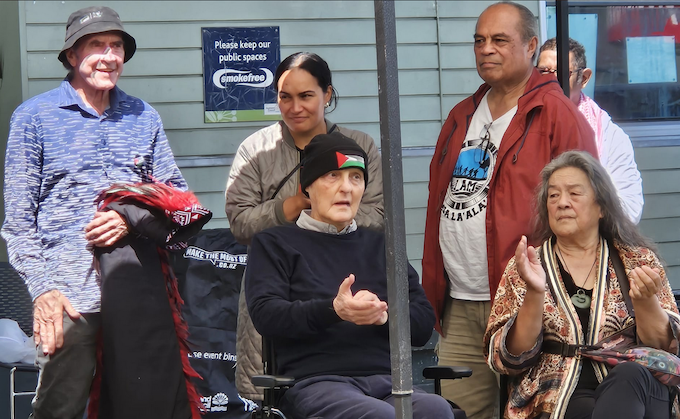
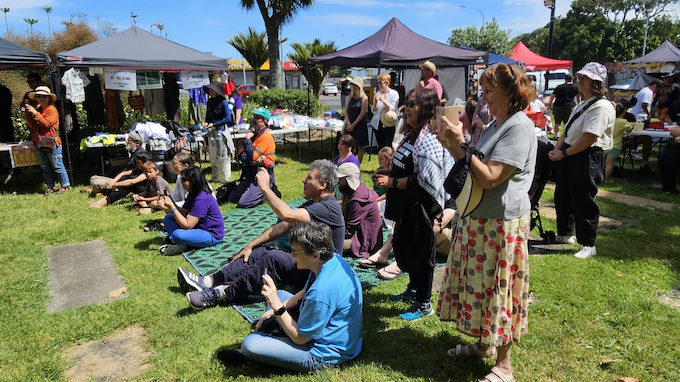

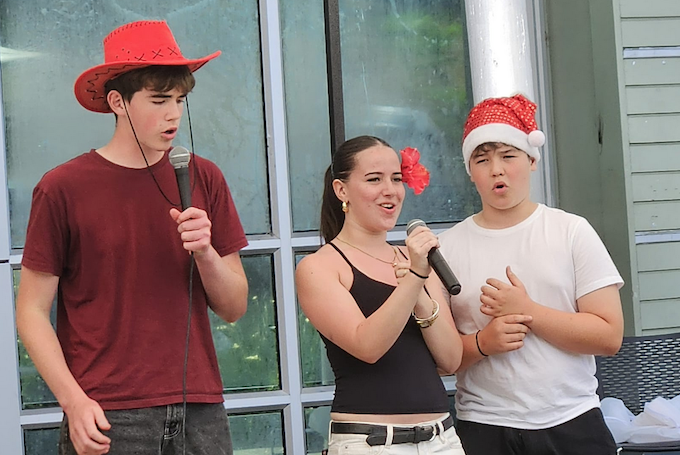
 Menaker (@willmenaker)
Menaker (@willmenaker) 


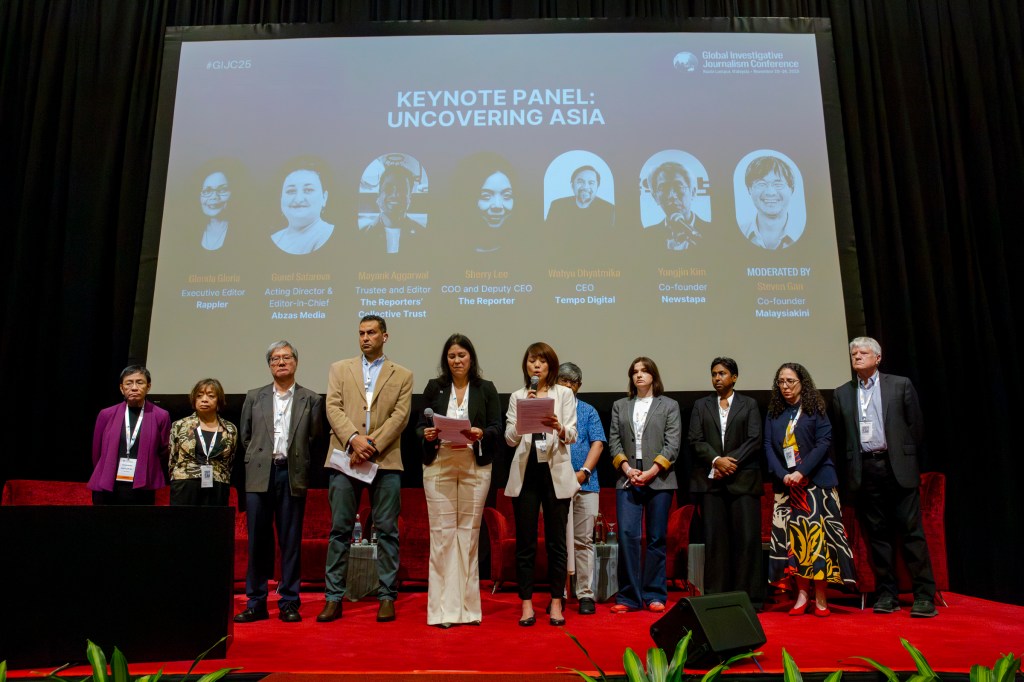
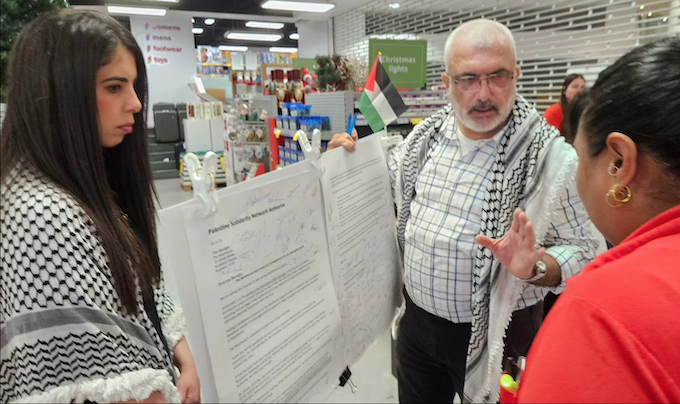
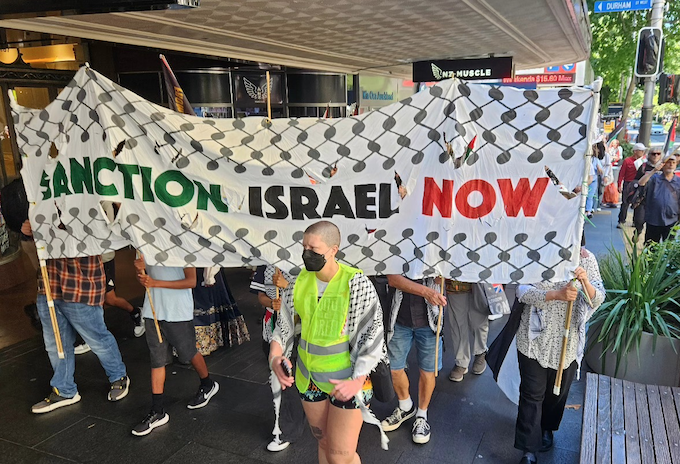

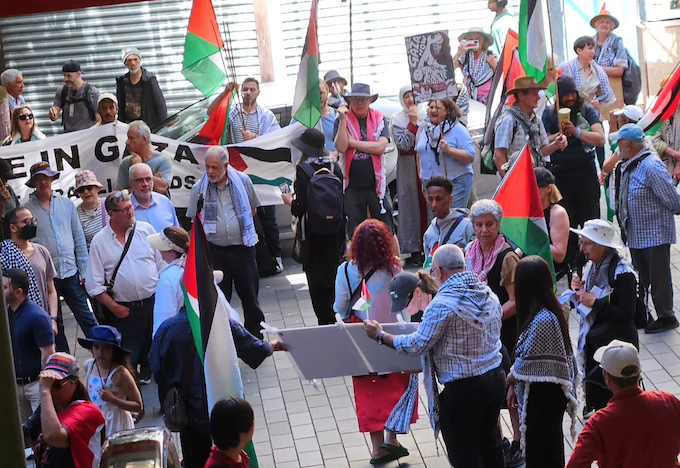




 Michael West (@MichaelWestBiz)
Michael West (@MichaelWestBiz)